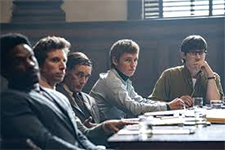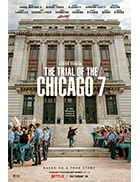The Trial of the Chicago 7
|  Writing 12 years ago about Brett Morgen’s pummeling documentary-cum-polemic Chicago 10, which portrayed the circus trial of eight (later seven) defendants charged with inciting a riot outside the 1968 Democratic National Convention in Chicago, I noted that, “Rather than just a clever rehash of recent American history, Morgen’s film carves out a piece of the past and serves it up as a heated admonition to the current generation who have yet to take to the streets for anything…. [it] bridges the past and the present to show that, the more things change, the more they stay the same—violence and injustice in ’68 are violence and injustice in ’08. Without ever once explicitly mentioning it, Morgen has made the most relevant film this year about Iraq.” Now, a dozen years later, we have Aaron Sorkin’s The Trial of the Chicago 7, which covers almost exactly the same historical ground, but does so from a decidedly different perspective and, given the differences in the political climate between 2008 and 2020, within a very different era. Both films emerged at a time of political crisis—2008 was brimming with fears of terrorism, discontent over the never-ending military engagement in Iraq, and a full-on economic meltdown, while 2020 has, well, Donald Trump and his four-year swath of cultural, political, moral, and global damage—which makes their recalling of past political events more than just a sharp history lesson. Rather, like Steven Spielberg’s The Post (2017), to name one recent example, they provide a window into the circular nature of power and dissent, protest and violence, change and obduracy. Sorkin’s is not a better film than Morgen’s, and they make for intriguing companion pieces, although Sorkin’s is arguably more honest in conveying the deep fissures among the various defendants, all of whom had different ideas about how ideological battles should be waged. As the title suggests, the film is framed by the trial of seven men, many of whom were unaffiliated and hadn’t even met each other prior to the trial, for conspiring to incite a riot outside the Democratic National Convention in Chicago in the summer of 1968: Youth International Party founders Abbie Hoffman (Sacha Baron Cohen) and Jerry Rubin (Jeremy Strong); David Dellinger (John Carroll Lynch), a long-time peace activist and leader of the Mobilization to End the War in Vietnam; Tom Hayden (Eddie Redmayne) and Rennie Davis (Alex Sharp), leaders of the Students for a Democratic Society; protestors John Froines (Danny Flaherty) and Lee Weiner (Noah Robbins); and Black Panther co-founder Bobby Seale (Yahya Abdul-Mateen II). An opening montage establishes all of the major characters and the heated cultural and political landscape within which they were waging ideological battle: the escalating U.S. involvement in Vietnam and the associated draft, the assassinations of Martin Luther King Jr. and Robert Kennedy, the general unrest that was so palpable by that summer that thousands of members of the Illinois National Guard were called to Chicago before the convention even started and Mayor Daley was on television declaring that he had given the okay for police to shoot arsonists. Sorkin makes clear right from the start that the trial, which dragged from April 9, 1969, to February 20, 1970, was a politically motivated sham designed to punish the idea of protesting cooked up by Nixon’s Attorney General, John Mitchell (John Doman), despite there being virtually no evidence of conspiracy (Lyndon Johnson’s Attorney General, Ramsey Clark, who is played by Michael Keaton, had previously declined to bring any charges for that very reason). Mitchell brings in a young federal prosecutor, Richard Schulz (Joseph Gordon-Levitt), to try the case; Schulz is a professional, but he is understandably leery about the case, which positions him as a kind of bridge character between the overzealous Nixon administration for which he works and the political radicals he is charged with protesting. Six of the seven defendants are represented by William Kunstler (Mark Rylance), a well-known free speech attorney who was sympathetic to their cause. Bobby Seale spent much of the trial without representation because his lawyer was in the hospital and Judge Julius Hoffman (Frank Langella), the cantankerous and clearly biased judge, refused to give him a separate trial and at one point had him literally bound and gagged in the courtroom due his outbursts. Sorkin, the playwright-turned-screenwriter and television producer responsible for A Few Good Men (1992), The West Wing (1999–2006), and The Social Network (2010), is making his directorial debut here, and he keeps the film energetic and constantly in motion. The material is inherently engrossing (not to mention infuriating), and Sorkin enlivens it with the intense dialogue for which he is known that elaborates the various fissures among the defendants. Far from being a unified progressive block, the members of the Chicago 7 approached their dissent from different and sometimes conflicting ideological perspectives. Whereas Dillinger was committed to absolute nonviolence, others were willing to use violence to meet violence. The biggest conflict is between Tom Hayden and Abbie Hoffman, the former of whom relies on respectable surface appearances and an air of seriousness to convey his counterculture message, whereas the latter is all in on conflict and nonconformity in every aspect of his being. Sorkin’s casting is excellent throughout; he brings together a group of committed character actors who embody their historical personas in ways that transcends period drag (Sacha Baron Cohen is particularly good as Abbie Hoffman, the flashiest role in the film, although mention must be made of the yeoman work by Mark Rylance as Kunstler and Eddie Redmayne as Tom Hayden, both of whom experience great frustration with how the trial is often hijacked by spotlight-hogging antics). The film’s central theme is embodied in Tom’s regular, increasingly desperate admonition that, “There’s no such thing as a political trial,” something the film shows is far from the truth. The main point of The Trial of the Chicago 7 is that it was nothing but a political trial: a highly mediated showdown between the establishment and the counterculture, a war of ideas in which those in power sought to punish dissenters not for actual crimes, but for their dissent. The film is both enthralling and frightening in how powerfully it dramatizes how the mechanisms of power can be corrupted against ordinary citizens exercising their rights to free speech and how quickly political conflict can escalate from rhetoric to physical conflict. Too much of the film feels terribly prescient in confronting us with the tragically cyclical nature of political violence even in a country that is founded on basic freedoms. Corrupted power is corrupted power, whether in 1968 or 2020, and The Trial of the Chicago 7, deeply entertaining though it may be, is ultimately sobering in how it dramatizes not how far we might fall, but how far we have already fallen. Copyright © 2020 James Kendrick Thoughts? E-mail James Kendrick All images copyright © Netflix |
Overall Rating: 


 (3.5)
(3.5)


